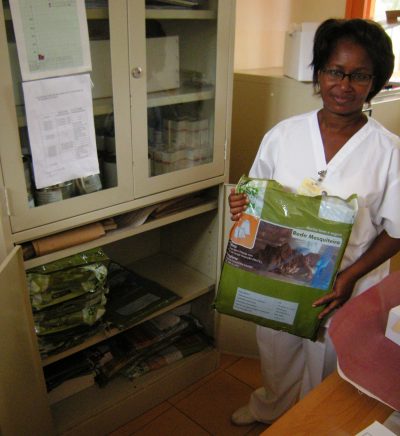Since 2002, under the leadership of ministries of health and national malaria control programs, mosquito net campaigns have delivered tens of millions of ITNs across sub-Saharan Africa.
As part of this integrated campaign, also supported by UNICEF, Population Services International, and the Mozambique Red Cross, the children received measles vaccinations and vitamin A to boost their immune systems. The campaign rented 18 warehouses, 15 trucks, and 131 light vehicles, and PMI supported, through its implementing partners, the training of more than 4,000 volunteers in the weeks leading up to the campaign.
Over the past year, governments in Cote d’Ivoire, Togo, Central African Republic, the Democratic Republic of the Congo, Nigeria, Malawi, and Tanzania also launched large-scale campaigns to deliver millions of ITNs. Consistently sleeping under an LLIN has been shown to reduce malaria incidence by 50 percent, and all-cause child mortality decreased by 20 percent in communities where ITNs were used in every household.
Mass net campaigns will increase the likelihood of achieving the ambitious 2010 Roll Back Malaria goal of 80 percent coverage of all populations at risk of malaria with insecticide-treated nets. Combined with high coverage for timely diagnosis and treatment, indoor residual spraying of homes, and preventive treatment of pregnant women, this will contribute significantly to achieving the PMI goal of reducing malaria-related mortality by 50 percent in the 15 PMI focus counties.
Since 2002, under the leadership of ministries of health and national malaria control programs, mosquito net campaigns have delivered tens of millions of ITNs across sub-Saharan Africa. Many of those campaigns, and others now being planned by ministries of health, have taken an integrated approach to ending malaria deaths and reducing child mortality due to other causes. Integrated campaigns typically include vaccinations, vitamin A supplementation, treatment for common intestinal worms, or nutrition activities. They allow ministries of health to reach large numbers of women and children at a lower cost per intervention by providing a “one-stop shop” for mothers who often travel miles seeking health care for their children.
The positive results being reported by several countries offer further evidence that the scaled-up interventions made possible by the investments of PMI and its partners in support of ministries of health are having a significant impact on malaria.

